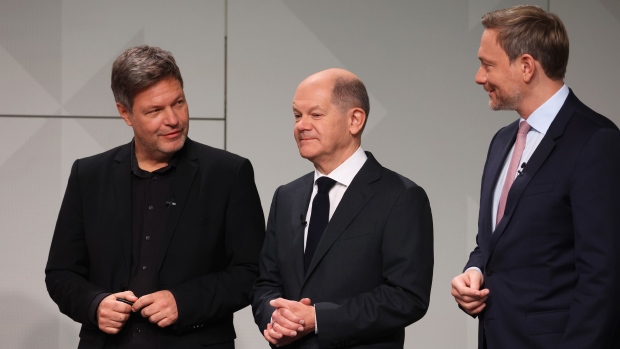Mar 28, 2023
Germany’s Fractious Coalition Strikes Joint Accord After Delays
, Bloomberg News

(Bloomberg) -- Germany’s ruling coalition struck a deal to back a bundle of climate protection and infrastructure measures after three grueling days of talks were required to reach an accord.
Chancellor Olaf Scholz’s three-party alliance of his Social Democrats, the Greens and the pro-business Free Democrats were trying to put recent public squabbling behind them and push ahead with enacting policies that are important for Germany’s technological and environmental transition.
The measures included a surprise increase of the truck toll and a decision to invest 80% of the revenues in the modernization of the railway network starting next year, Ricarda Lang, co-leader of the Greens, told reporters on Tuesday in Berlin.
“These were not easy negotiations by any means, and it was a struggle in very many areas,” Lang said.
FDP leader Christian Lindner, who is also finance minister, said that the planned ban of oil and gas heaters, a pet project of the Greens, is off the table.
“There will be no obligation to exchange existing heating systems,” Lindner said. “We will financially support citizens who choose to modernize their heating systems with a program out of the climate and transformation fund.”
They began their meeting at the chancellery in Berlin on Sunday evening before talks were halted without a deal early on Monday afternoon. Officials reconvened on Tuesday morning and eventually emerged around 8 p.m. to announce they had reached an accord.
That it took the coalition partners so long to overcome their differences will do little to dispel the impression that the government is already something of a spent force after only 15 months in power.
‘Strange Decisions’
SPD co-leader Lars Klingbeil said that coalition leaders had “very consciously” agreed to not wrap up their talks under time pressure in order to avoid “strange decisions” which in the past often had been made in similar situations. “It took longer this time to get things clarified — and that should not become the rule in coalition talks,” Klingbeil said.
One of their most pressing tasks has yet to be tackled: agreeing on next year’s budget. The process has already been delayed and is more complex than in recent years due to Lindner’s insistence on restoring a constitutional limit on net borrowing.
The so-called debt brake was suspended to allow generous government spending to offset the impact of the pandemic and the energy crisis.
“We have achieved real breakthroughs, real paradigm shifts and that’s why the result simply speaks for itself,” Lindner said. “So if we get together for three days and always manage to achieve such profound results that will change the country, then in the future we should go into retreat for three days every month.”
(Updates with comments from party leaders starting in the fourth paragraph)
©2023 Bloomberg L.P.






